Snake Charm has fantastically good starting land (Floodplains over Grassland with a healthy helping of Cows and Clams)!
While Snake Dream is a Wonder Builder's paradise... well, sort of, coming as it does equipped with easy access to Marble and Stone.
Brett's Games
Snake River
Play Through
CIV IV
Beyond The Sword
4000BC - Emperor
007 - Snake River - Game Save
World Builder File
007 - Snake River - World Builder
Dual City Start
The More the Merrier.
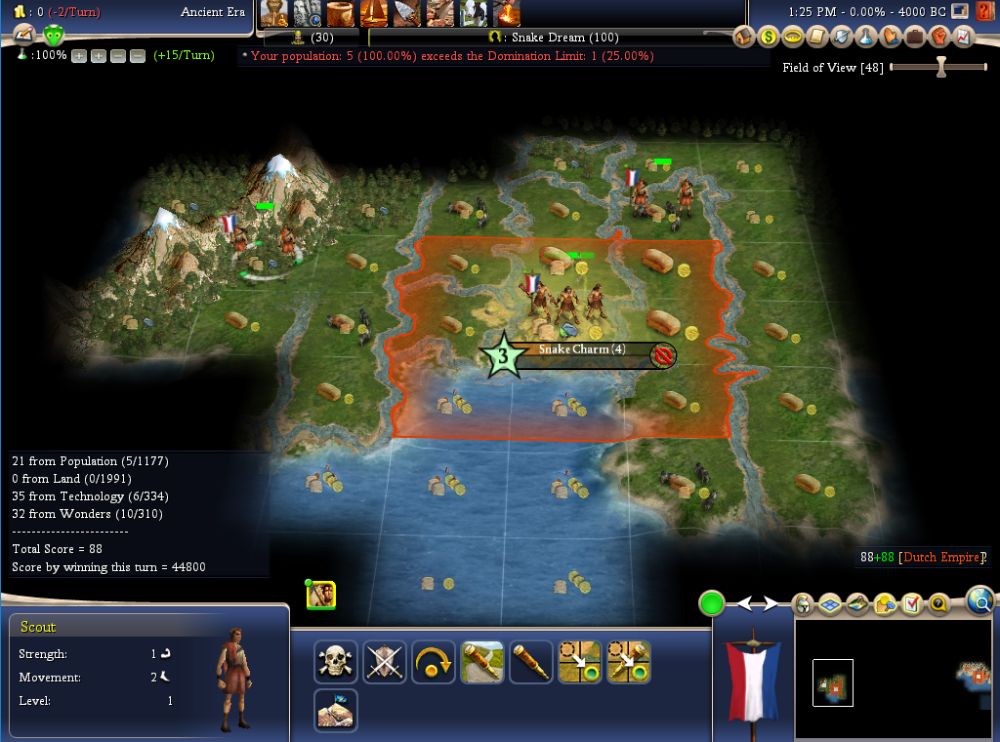
Land
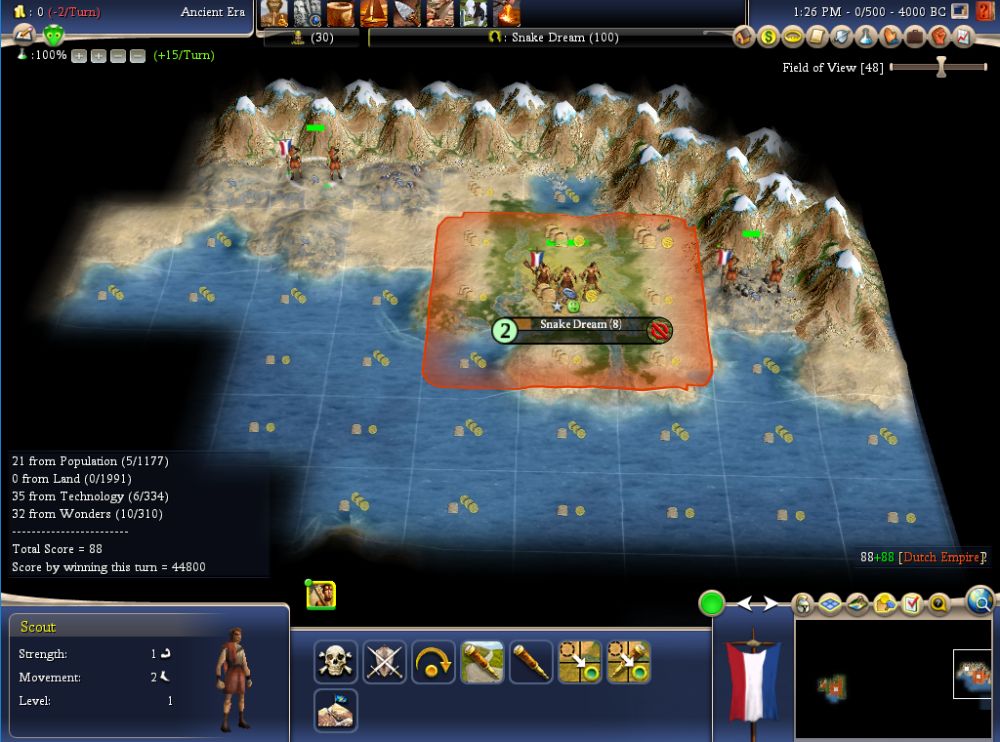
Land
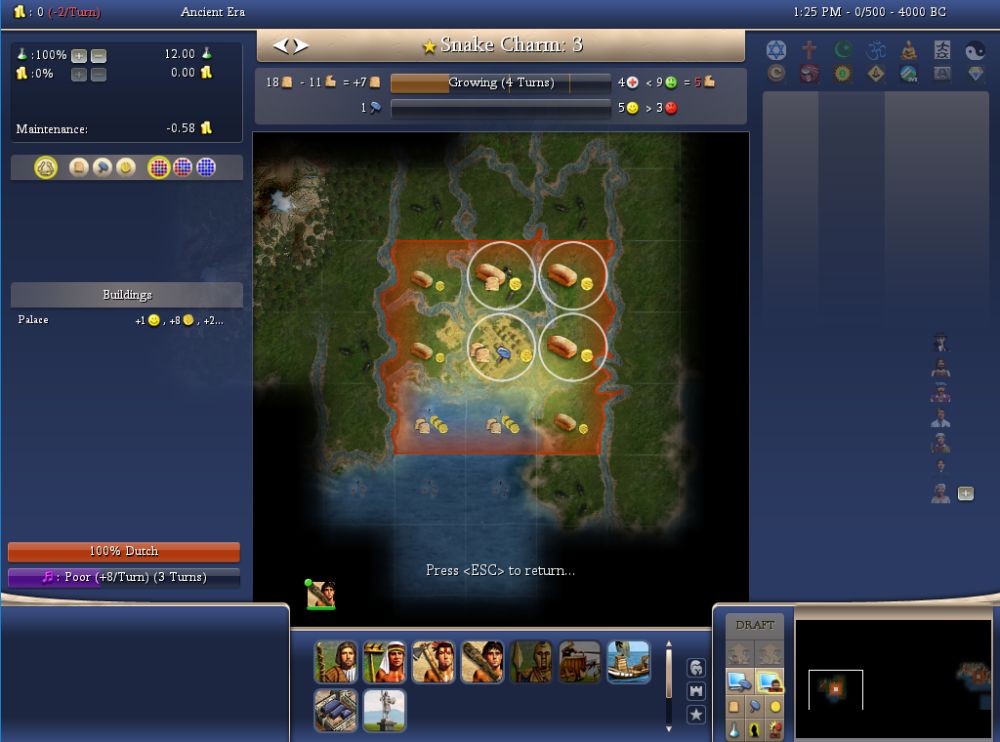
City
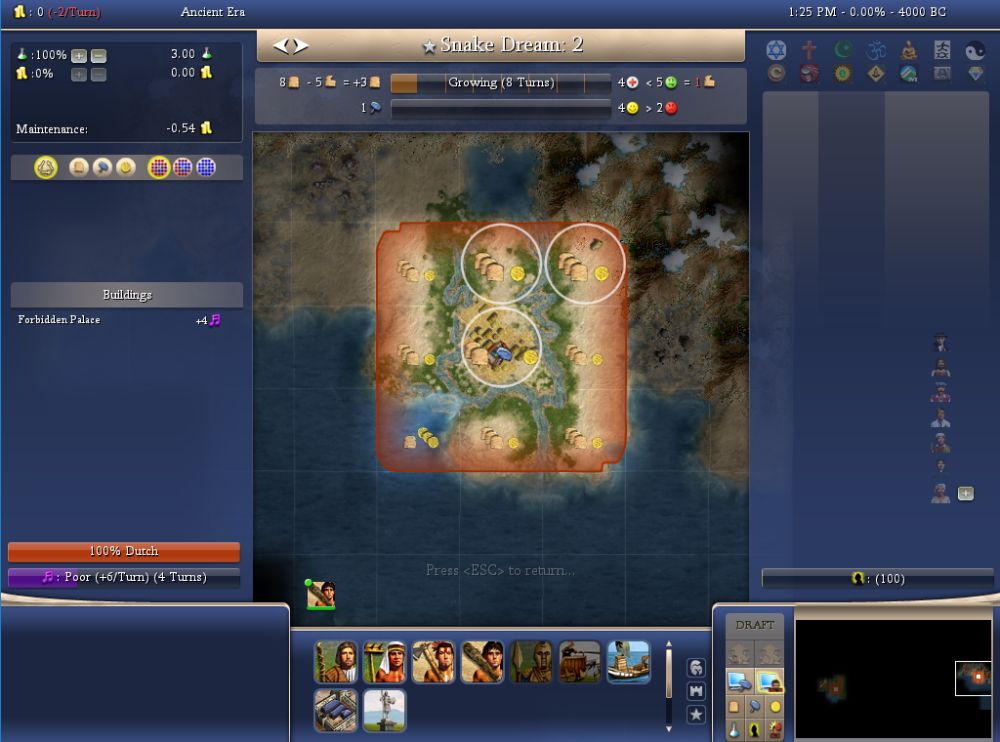
City
Snake Charm starts with the Palace.
Snake Dream has the Forbidden Palace.
Dutch
William van Oranje
a.k.a. Snake Master
Flat
Standard World Size
No Barbarians
No Technology Brokering
Require Complete Kills
No Vassal States
No Tribal Villages
No Random Events
No Espionage
Although the Setting is No Barbarians, there are twenty or so pre-placed wandering animals on the board.
Game Save Uses:
Beyond the Sword 3.19
BUG Mod 4.5 [Build 2221]
BULL 1.4 [Build 243]
BAT Mod 4.1
Um, for every other Civilization that one has made contact with that knows a given Tech, that Tech becomes cheaper to research.
Applying The Whip adds one to unhappiness for an additional ten turns (both values are on top of any current modifiers).
While the hammers one receives for each Population Whipped is shown below.
Meaning, each Population yields 30 hammers for partial builds (at least one hammer completed) and 20 hammers for new builds (i.e. something Whipped during the first turn of construction), while the hammer yield for Wonders is 15/10 under the same circumstances.
And if that's too complicated... well, one gets about 30 Hammers per Population point. And the rest is needless complexity.
Oh, one last tidbit. One can only sacrifice half of a City's Population on any one use of The Whip. So, a City of size 4 can only Whip away two population points.
And that's about what a person needs to know about Slavery... except (maybe) that the Globe Theatre gives unlimited Happiness, so in the City where that is built, one can use The Whip with impunity.
Mu-ha-ha!
Snake Dream has the Forbidden Palace.
Game Settings
Emperor DifficultyDutch
William van Oranje
a.k.a. Snake Master
Flat
Standard World Size
No Barbarians
No Technology Brokering
Require Complete Kills
No Vassal States
No Tribal Villages
No Random Events
No Espionage
Although the Setting is No Barbarians, there are twenty or so pre-placed wandering animals on the board.
Game Save Uses:
Beyond the Sword 3.19
BUG Mod 4.5 [Build 2221]
BULL 1.4 [Build 243]
BAT Mod 4.1
Good To Know
As follows are general strategies, generic game play advice, and map specific notes that may (or may not) prove to be particularly useful, while playing this map.Religion
None of the other Civilizations start with Mysticism (even if they normally would have, though if one loads the World Builder file and plays the map as a Scenario that might change, as I don't know if Mysticism is somehow automatically added back to the relevant Civilizations). Anyhow, long story short, as I am playing (using the Emperor save game, above), no one else has Mysticism, so one (meaning you or me, depending upon who is playing) is a shoe in to research either Buddhism or Hinduism. I, myself, will be going for Buddhism. And to be honest, I don't care if others say that researching a Religion first thing out of the gate is a second rate strategy. It probably is. But that doesn't mean I don't prefer playing a second rate strategy.Scouts
Netherlands (the presumed Human Player) starts with two Cities and four Scouts. At the higher levels (I'm playing at Emperor), Maintenance will become an issue almost immediately. Personally, I plan to disband those Scouts just as soon as they've served their purpose... and made contact with all the Computer Controlled Civilizations... for the Known Tech Research Bonus, if nothing else.Um, for every other Civilization that one has made contact with that knows a given Tech, that Tech becomes cheaper to research.
Workers & Settlers
Without a doubt (well, at least, as I write this), the most import units for the first part of the game will be Workers & Settlers. I plan on building a whole bunch of them.Split the Difference
The start is so food rich, one might consider settling multiple Cities at a higher density than usual. In Snake Charm, I am planning on circling the Grassland Floodplains (yielding five food each with no improvements) with four or five satellite cities (all snug in and close, way closer than I normally would), so as to share that awesome starting food.Cultural Win
I think it (always) makes sense to keep the possibility of a Cultural Win handy in one's back pocket. Certainly, with all that food, it's a viable option. And since (in theory) we're all playing at a higher Difficulty Level than normal (what this map is all about for me), it may be the only option.The Whip
Finally, there is The Whip to consider. Such ample food (an over-abundance, actually) just begs for the use (and abuse) of the Slavery mechanic. So, a short lesson on using The Whip is in order.Applying The Whip adds one to unhappiness for an additional ten turns (both values are on top of any current modifiers).
EXISTING +2 unhappy for 16 turns
THIS WHIP +1 unhappy for 10 turns
FINAL +3 unhappy for 26 turns
While the hammers one receives for each Population Whipped is shown below.
| From Scratch | With Hammers | |
| Building/Unit | 20 | 30 |
| Wonder/Project | 10 | 15 |
Meaning, each Population yields 30 hammers for partial builds (at least one hammer completed) and 20 hammers for new builds (i.e. something Whipped during the first turn of construction), while the hammer yield for Wonders is 15/10 under the same circumstances.
And if that's too complicated... well, one gets about 30 Hammers per Population point. And the rest is needless complexity.
Oh, one last tidbit. One can only sacrifice half of a City's Population on any one use of The Whip. So, a City of size 4 can only Whip away two population points.
And that's about what a person needs to know about Slavery... except (maybe) that the Globe Theatre gives unlimited Happiness, so in the City where that is built, one can use The Whip with impunity.
Mu-ha-ha!
And With That Said
Let The Games Begin
Spoilers Warning
The Post Game Debriefing Follows
Um, actually, there's precious little game-specific information in the commentary that follows.
But, whatever...
Let's just say, life is but a charming dream... full of snakes... and/or other nasty things.
Um, actually, there's precious little game-specific information in the commentary that follows.
But, whatever...
Let's just say, life is but a charming dream... full of snakes... and/or other nasty things.


The Data Dump
I played until Turn 220; and then, realized I could do a lot better. So, I reloaded, played again (aborted after a few dozen turns), and reloaded one final time, playing the map all the way through.BAT Autologs
Logs of the Games: Turn by Tedious Turn008-snake-river-bat-autolog-one.txt
008-snake-river-bat-autolog-aborted.txt
008-snake-river-bat-autolog-two.txt
In Game Notes
Highlights of My Thoughts008-snake-river-notes-one.txt
008-snake-river-notes-two.txt
Phone Notes
It's been a while, but I'm pretty sure these were the raw notes I made to myself in preparation for the second game {overlaid with more recent notes now that it is all over: note the brackets {}}. You know, so more ramblings... even less cohesive than the main post.008-snake-river-notes-phone.txt
Game Saves
I aborted the first game in the heat of battle.008-snake-river-one-1550AD
There is no save from what I am calling the 'aborted game'.
While the second game, I played through all the way to the bitter (and/or glorious) end.
008-snake-river-two-1830AD
This being the Replay from the second and victorious game (The Hall of Fame file).
008-snake-river-two-replay
Recap of What We Know
An item by item commentary on topics covered in the pre-game Good To Know section above.Religions
By the end of the game, only half of my cities had a Religion, as I did not find it worth the effort to create missionaries. It might be fun to play some sort of Scenario wherein Religions were made important. And I think there is such a Scenario included in the game. But off the shelf, Religions do not do much, as it's only +1 happiness after building a Temple, which in turn likely requires the building of a Missionary.Also, I typically find it more compelling to take the Diplomatic Bonuses of going with the majority Religion on the board... or the religion of my nearest psychotic neighbour.
However, I do like the synergy that Temples allow if one has the right Wonders: The Monk Economy.
Temple Bonuses from Wonders
The Sistine Chapel: +5 culture
The Spiral Minaret: +2 gold
The University of Sankore: +2 research
Much like how Nationalism provides +2 happiness from Barracks, the inclusion of these bonuses makes building Temples very desirable wherever possible.
Still, outside of a specialized Scenario, Religions are more of a Sugar Coated Frosting than anything strategically important.
{Ha! Let me just say, two games later and I disagree with all this, as I am finding a Monk Economy to be highly compelling.}
Scouts
I am not much of a scouter. I do not put forth the effort required to get advance intelligence from my opponents. I wonder if I would build a single scout if I did not start the game with any, opting for melee units instead.Workers & Settlers
I did a pretty good job of spamming both Workers & Settlers. I probably built enough Settlers. But I could have used twice as many Workers. By the end of the game, many tiles remained unimproved; and as such, many Cities were falling short of their true potential. Suffice to say, based on my gaming style, I cannot over-pack Cities... and should over-build workers.{Once again, two games later, and I disagree with the over-packing of Cities part, but still agree that I under-build Workers.}
Nationalism
Nationalism allows the Drafting of Units, which in later stages of the game, I used as a replacement for The Whip. For a full on war economy, Nationhood is a must.As to Game Settings
I used the following Game Settings on a Custom Map.Emperor Difficulty
The AI did not perform significantly better at this higher Difficulty Level. I mean, I'm sure the computer did better than it would have on Noble. But the strategies that the computer used were not better. And I have no great need to give random handicaps (faster research, faster production, lower upkeep costs) to my Computer Controlled Adversaries. I'd rather control the starting positions (as I did this game) and give the computer a better start (opposite of what I did this game) if I wish a greater challenge.Flat
I almost always play on some sort of wrapping world with the sea fully traversable from left to right (or East to West). But having a Flat Map, made the play seem more like that of a Board Game (of old). And I liked it.Standard World Size
Considering the other parameters (number of opponents, the requirement for Complete Kills, and no Vassals), a map this large was a bit of a drag. I am planning on the next map being much smaller in scope. So, if this map was 64x40 (which it was), I'm thinking something alone the lines of 40x20 (seems awfully small) for the next one, which I believe is around the size of a Duel Map.No Barbarians
I've never been a fan of Barbarians. So, it is more fun to play with them off. But in making custom maps, I do want to include more pre-placed Barbarian Cities. The next game will likely have one or two.No Tribal Villages
Tribal Villages are, also, known as Goodie Huts. And they feel like cheating to me. Also, I'm not big on scouting, so I don't seem to discover them very often. As such, I continue to play without them. And I am satisfied with the results.No Technology Brokering
No Tech Brokering is the ideal middle ground between Standard Tech Trading and No Tech Trading. In No Tech Brokering, one can only trade those Techs which one has researched for themselves. So, there is no fear of your Brand New Tech being trading to one and all once you have traded it to a single ally... and/or opponent. I like this option. I works well for me.Require Complete Kills
Requiring Complete Kills was a pain. I will not be playing with this option again. Once the final City was destroyed, I still had to hunt down any wayward units (Scouts & Explorers), which until I did caused as much War Weariness (and City Unhappiness) as having a viable opponent in the game. I will not be using this option again.{He, said. Already thinking of the exceptions.}
No Vassal States
I have mixed feelings about Vassal States. As I get better at using the World Builder (and in creating Scenarios), perhaps I will be able to set those Diplomatic Modifiers to my liking. But in the meantime, the advantages of my getting Vassals is about evenly offset by the annoyances of the computer getting Vassals. It is something that I will have to weigh carefully when making maps (or, you know, just let the defaults rule). And yes, I think Custom Maps (and Mods) is the future of my CIV IV play... for a while.No Random Events
If one could choose their own Quests (or if Quests had meaningful rewards), they would be more fun (read, useful). As it is, they are color without context. I did not miss them. And I doubt I ever will.No Espionage
As far as I can tell, disabling Espionage also disabled the Wonders Demographic Screen. I have no great love of Espionage. But then, let's face it, I barely know how to use it. It will stay in the game, so I have access to the Wonders Demographic Screen, if nothing else.And that, I believe is a rundown of the various Game Play Settings I selected.
Game Play Debriefing
This was a food rich start. But the hammers were rather lacking.In the first play through, I concentrated on Wonders (big mistake) and spaced my Cities rather far apart at five spaces (the distance at which their Fat Crosses would not overlap).
In the second game, I skipped the Wonders (for the most part) and went into full on REX mode (Rapid Early Expansion) from the get go, settling my Cities at three spaces apart (more or less), packing them as close together as the game would allow.
The Technology Race
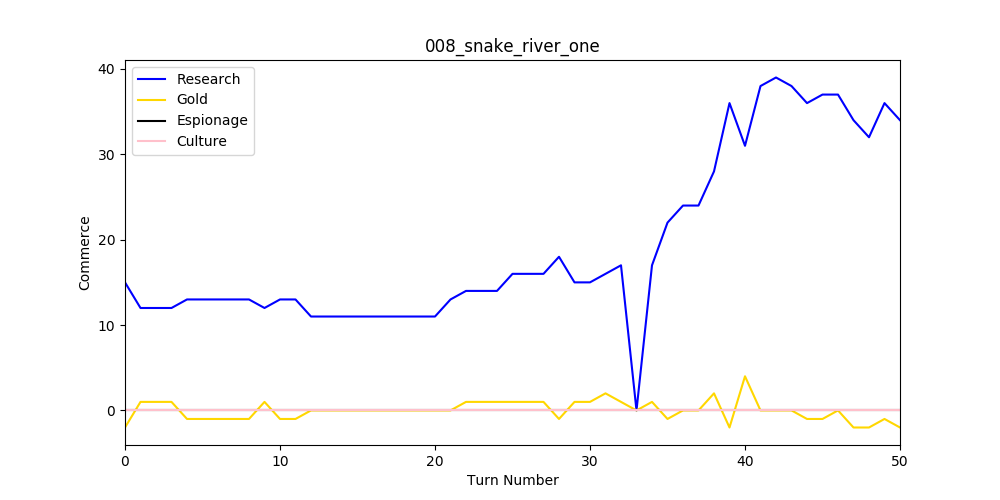
Improving
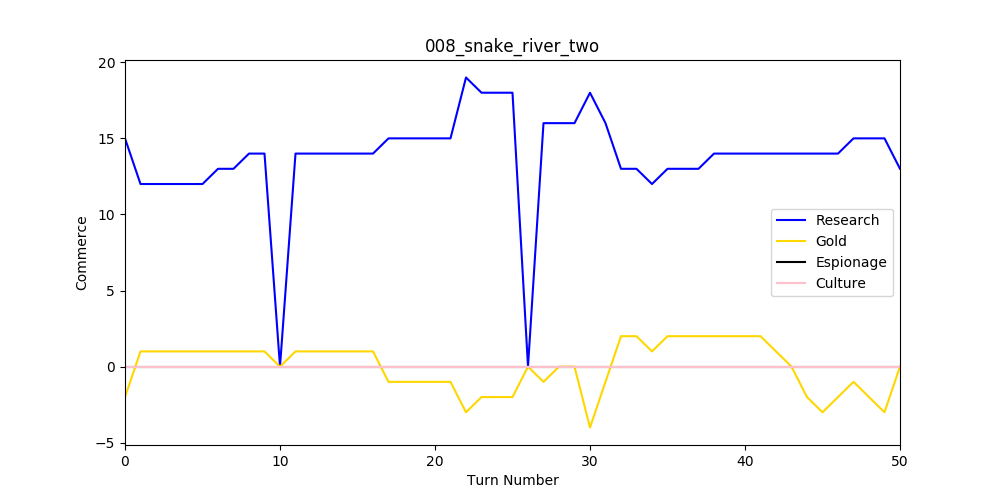
Flat
The dips to zero are revolutions.
Even though the tech rate looks better in the second graph (to the right), the scales differ, so the one on the left is better... and I'm not really sure why.
Even though the tech rate looks better in the second graph (to the right), the scales differ, so the one on the left is better... and I'm not really sure why.
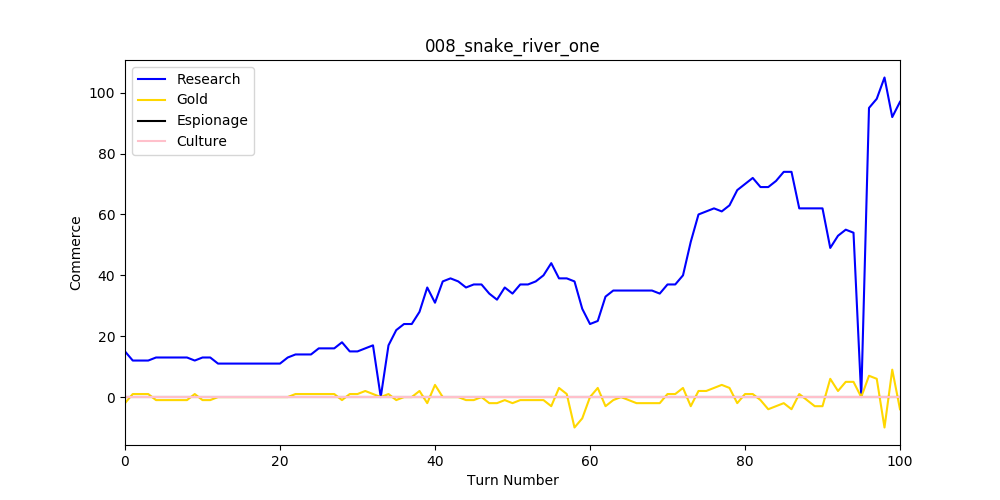
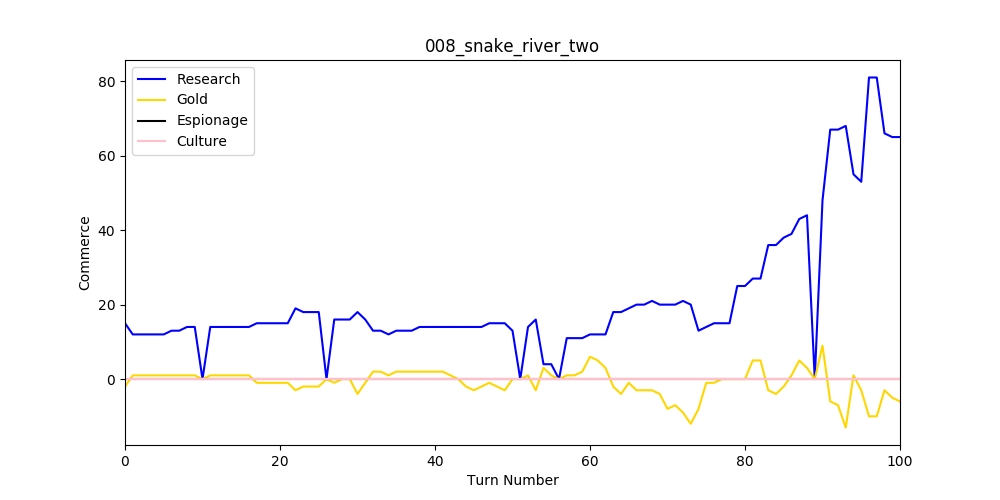
Once again, once one adjusts for the different scales, the graph on the left is much better: faster out of the gate and better towards the end.
Of course, this shows only the first hundred turns.
Of course, this shows only the first hundred turns.
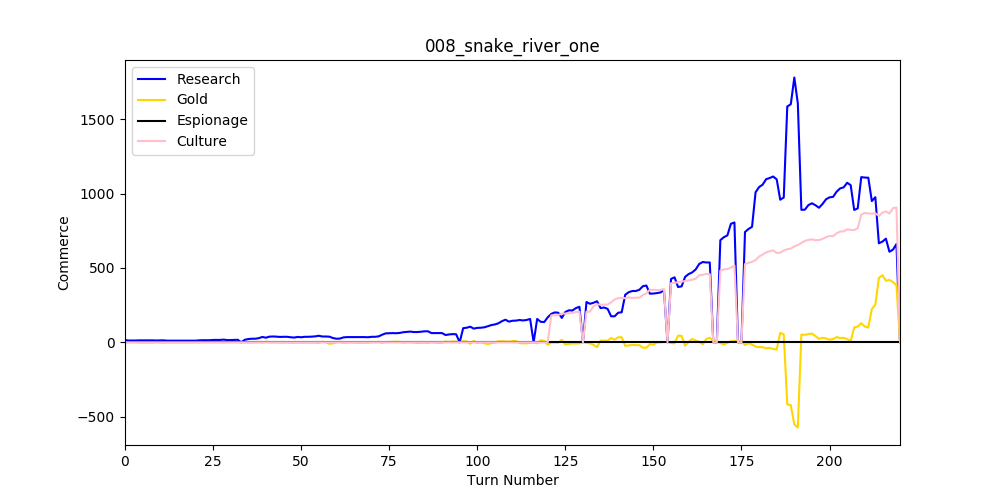
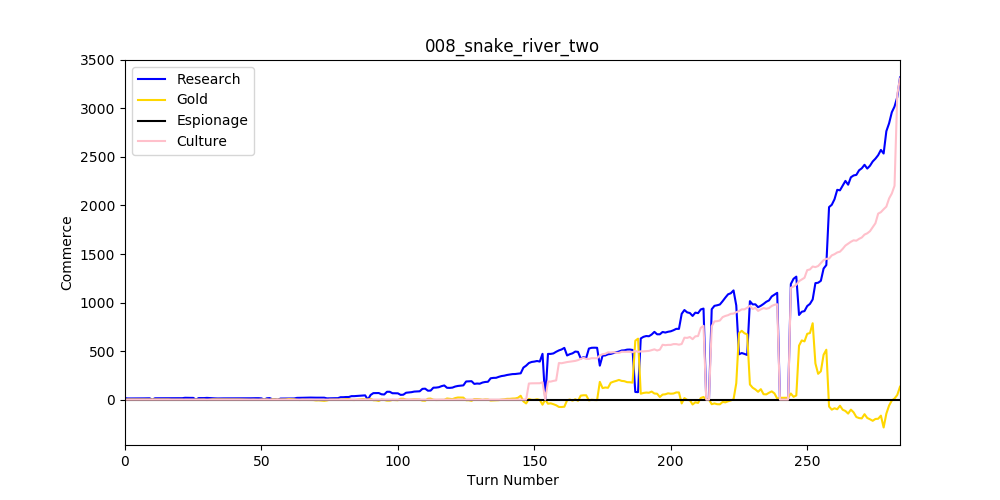
The truth is that although I would have thought I did a better job of REX'ing in the second game, I may well have done better in the first... certainly from a Research perspective, I did.
And in a brief analysis of Game 01 & Game 02 again, I came to the following observations:
And in a brief analysis of Game 01 & Game 02 again, I came to the following observations:
Game 01 at Turn 100 (roughly) 13 Cities 155 Beakers/Turn No Island Cities Gandhi Not Isolated Game 02 at Turn 100 (roughly) 12 Cities 145 Beakers/Turn 2 Island Cities Gandhi IsolatedAnd although I have no desire to play this map again, I believe I can do better. So I am going to play the first hundred turns over and see what numbers I can come up with.
TOTAL REPLAY
To play better, I had to play for real... all the way through to the bitter end.
I played through to turn 100 a half dozen more times... and finally wound up playing one last time all the way through. Those first half-dozen attempts were not very good.
I played through to turn 100 a half dozen more times... and finally wound up playing one last time all the way through. Those first half-dozen attempts were not very good.

Snake River
Game Two
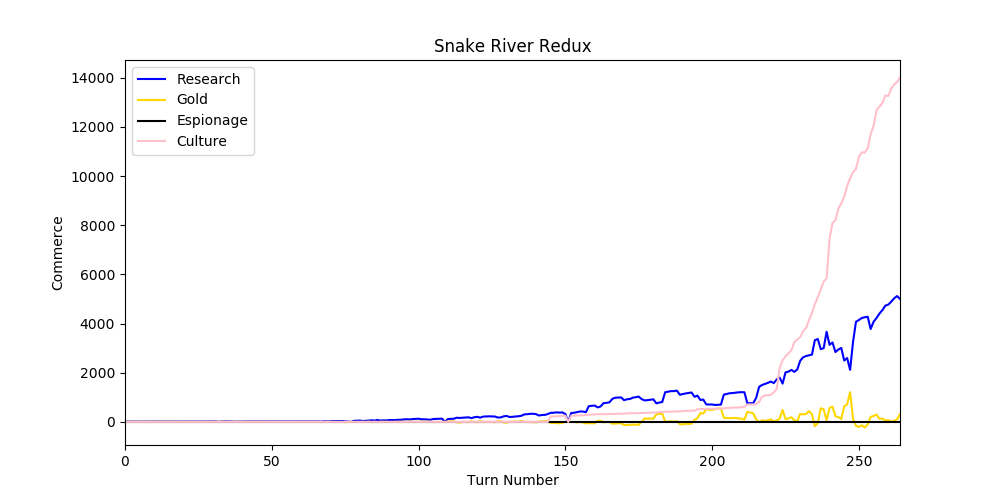
Snake River
Redux
Previous Game Two on the left, the Redux Game (the replay) on the right. The scales are different, but the one on the right is a much better graph. Oddly, even though culture is through the roof, a Cultural Victory was still over a hundred turns away. On the other hand, I likely would have won a Diplomatic Victory the next Election Cycle, as I controlled all the votes I needed.
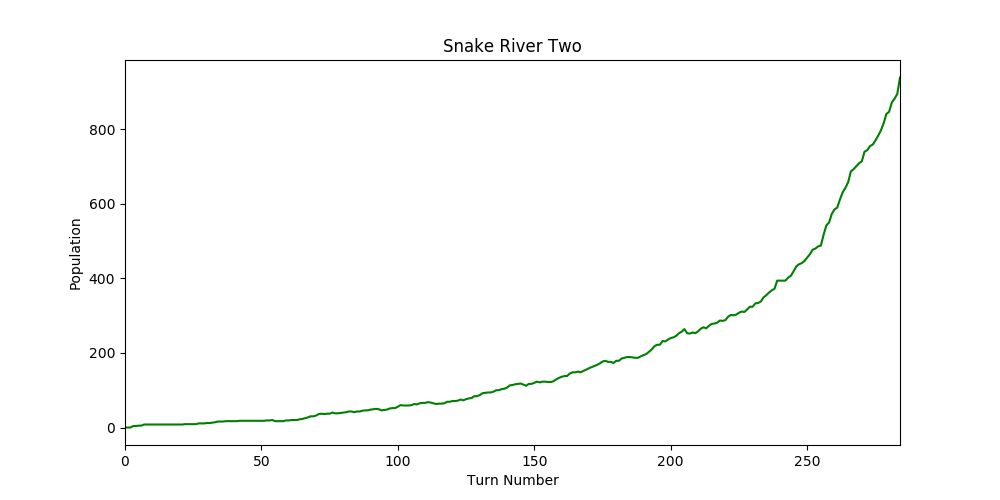
Snake River
Game Two
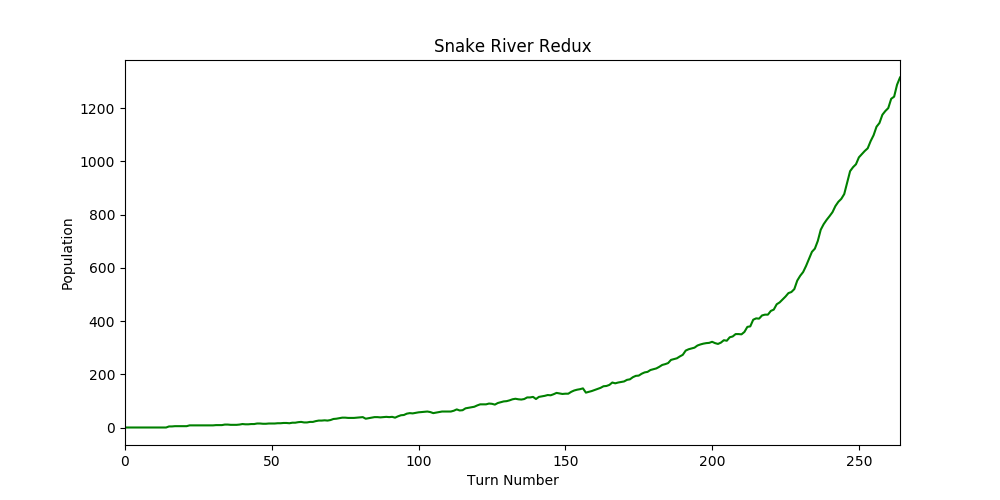
Snake River
Redux
I extended my graphing script to include population. The graphs are rough, as the information provided in the auto-log is incomplete. But they give an idea of the greater acceleration in Redux. Though, for the most, the shape is the same.
Game Two (left) ended on Turn 284; whereas, Redux (right) ended on Turn 264. Redux was the better game all around with a population +/-50% higher, 20 turns before.
Game Two (left) ended on Turn 284; whereas, Redux (right) ended on Turn 264. Redux was the better game all around with a population +/-50% higher, 20 turns before.
A Whopping Big Score
Game Two Redux
T284 T264
7,426 8,981
170,654 271,395
Redux was a much better game.
- I isolated my opponents.
- True, this was a result of my knowing the map.
- But shows the importance of scouting.
- Anyway, I founded cities to block India, Spain, and the Incans isolating them and allowing me to settle at my own pace.
- I settled the base city sites first.
- In previous games, I settled from near to far. In this play-through, I settled the best sites first.
- My second strongest city was created by my first settler.
- I actually used my Great People.
- One Great Merchant founded Sid's Sushi.
- I used six others to start three Golden Ages.
- And I lost another scouting out enemy territory.
- Apparently, Great People do not recognize borders.
- I concentrated on what's important.
- I founded no Religions.
- I got my Worker Techs in early.
- Settlers and Workers were my early builds.
Redux Game Saves & Such
Final Save008-snake-river-redux-1770AD
Replay
008-snake-river-replay-redux
Bat Autolog
008-snake-river-autolog-redux
A Zip of Those Six Practice Game Autologs
008-snake-river-autologs-pre-redux.zip
In Game Notes
008-snake-river-notes-redux
And then from here, we are back to what I'd written prior to my Redux Replay.
Thus, I shall close (what is getting to be a rather long Post Game Debriefing) with two mini-essays (if essay is the right word for it) on:
- the importance of a good military,
- some thoughts regarding reloading and/or cheating,
- and a simple note regarding in-game sign placements.
The Sword is Mightier
To my chagrin (and maybe why CIV IV will have limited appeal to me in the long run), a Military Strategy Beats all other Strategies in CIV IV. In that, any strategy which does not have a military component will always be subject to military invasion and conquest.Eh, this may seem self evident. But it is worthy of note.
Military > Culture Military > Religion Military > Espionage Military > CitiesRock beats Scissors (or that is to say, Military beats everything else) all of the time.
Or in other words, the Final Field of Battle is always on the Field of Battle. And any strategy that does not take this into account is secondary.
Eh, so maybe my next write up (or in game strategy, anyhow) should be more (much more) Military Focused.
But before that (the next game and/or the next write up), let's spend a moment talking about cheating.
On the Fine Art of Cheating
Reloading is cheating, pure and simple. And reloading is inferior to playing straight through, once again, pure and simple. Still, that's not the end of the discussion... not by a long shot, as it's a lot more nuanced than that.- The case against reloading:
- It's weenie.
- Come on, we all know that it is.
- It teaches bad habits.
- Strategies that seem viable after multiple reloads, often are not.
- It reveals the fog of war.
- That which has been seen cannot be unseen.
- The case for reloading:
- It's a tactical aid.
- Trying out different Battle Tactics is easier.
- It's a strategic aid.
- Trying out different strategies is easier.
- And more importantly, one has an opportunity to Feel what it is like to win.
- It's more fun.
- Eh, maybe it is, maybe it isn't. But really, who are you or I to say.
Reloading is for Weenies
Sure enough, it is. And I cannot argue against this simple fact.Reloading Teaches Bad Habits
When I first started to play CIV IV, I would reload if combat went bad for me or Montezuma declared war, hoping that on reload, if I played just a little bit differently, things would go my way. But the problem wasn't that I needed to play a little bit differently, but a lot differently. Now, it doesn't matter much if I lose a unit or two in battle, because I bring enough units (enough to absorb any loses). And although I would prefer Monty did not declare war on me, I know now that if he does, it is because I am not building enough troops, not because I am getting 'unlucky'.The point being, small reloads, hoping for incrementally better outcomes, are a fool's game (call it a crutch) and serve no useful purpose.
Reloading Removes the Fog of War
After reloading, one knows the map (choke points, city sites, etc) and/or an enemy's intent (stack size, objective, and so on). And these things cannot be unknown.But in truth, since I do not value (at the present) the surprise/discovery aspect of CIV IV (making my own maps, I am), I don't personally find this to be a problem.
Besides, the human player knows the type of map on which they are playing, any special game settings, and so on. Does the AI? I don't think so. And knowing that one is playing on an Archipelago Map is obviously of great importance... and likely of much greater importance than knowing where Monty's Capital is.
All the same, it cannot be denied that (typically) upon reloading, a human player has more information on the second play-through than they did on the first. And not only are these Revealed Secrets an advantage, but having them, removes a bit of the fun for some.
Anyway, I am hardly going to argue that reloading is better than not reloading (or even just a wash). But I will (happily) argue that reloading has its place... in the learning process, if nowhere else.
Reloading is a Tactical Learning Aid
OK. Remember when I said it was a mistake to reload based on battle outcomes. Well, it is. But reloading, also, just so happens, to be a viable way to learn Battle Tactics, by doing it over an over until one gets it right... or becomes convinced that they did not bring enough troops to party.Any individual game play decision falls into the category:
To Raze a City or not?
To Research this or Research that?
To Refuse a Diplomatic Request or Grant the Boon?
Reloading allows more rapid tactical advance.
Reloading Allows More Rapid Strategic Advance
As I am still learning the game, after almost every game (yeah, I think it has been every game), I come away with the feeling that I could have done better... if only I had done things differently. Reloading allows one to do things differently, but under very similar conditions, so one is not guessing as to the better alternative. I mean, most all alternatives have some sort of give and take, so it can be difficult to measure the advantages of one (slightly better) strategy from another. But it is possible. And in my (ever so humble opinion), reloading is the venue in which to prove whether a strategy is, indeed, better.Further, after knowing more about the map, the opponents, how this game will likely play out, one is in a better position to win. 'By cheating,' the detractors will say. And this may well be true. But the first step to winning is knowing what a winning game looks like and feels like. And replaying for the win can do just that... or it can allow one to dial the strategy in too tightly: a strategy that works for this situation and no other.
Eh, that last may too often be the case.
But many a player will advise a newbie to declare war sooner and more often. But when is too soon. And when is too often. Well, this is the advantage of replaying various versions of the same scenario: one slowly learns when 'the time is right.' I cannot emphasis enough how important it is to Feel What it is Like to Win in almost any endeavour in life. CIV IV is no expectation.
Reloading is Simply More Fun
Is it? Is reloading more fun? I don't know. But I would argue it is more fun than losing yet again. And since the game is about fun, this rational easily trumps the rest.Fake it until you make it.
And if that requires cheating... well, isn't that sort of what 'faking it' means?
And now if you'll excuse me, some limited resources desert world awaits...
Nope, sorry. Instead, I wanted to see how I'd fare on a random map.
It took me way longer to win than I would have liked. But at least when I finally did win, I won big... real big... really-really big.
Nope, sorry. Instead, I wanted to see how I'd fare on a random map.
It took me way longer to win than I would have liked. But at least when I finally did win, I won big... real big... really-really big.
alt-s
alt-s enters sign placement mode in CIV IV. But to be honest, I do not find the feature to be overly useful... and may never use it again.